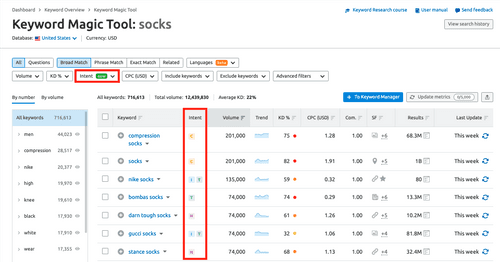Explore the World's Best Ideas
Join today and uncover 100+ curated journeys from 50+ topics. Unlock access to our mobile app with extensive features.
The Four Types of Keywords
Most Search Engine Optimisers commonly agree that there are four main types of keywords to classify intent:
- Informational — searchers looking for an answer to a specific question or general information.
- Navigational — searchers intending to find a specific site or page.
- Commercial — searchers looking to investigate brands or services.
- Transactional — searchers intending to complete an action or purchase.
26
111 reads
Informational
There are plenty of keywords with significant search volume that don’t bring website conversions because people are simply searching for information. We call these searches informational keywords.
You can distinguish this type of keyword by “question words” as they usually contain clues like “what is,” “how,” & so on.
Google SERP for informational searches commonly contains knowledge panels, carousels, or infoboxes to provide quick answers when applicable.
25
72 reads
Informational (contd.)
These keywords carry less intent to take real action compared to transactional or commercial keywords.
However, they can be valuable in building brand awareness by targeting them with informational content and educating your audience.
By targeting these terms, your website could become an authority in your niche and trusted by those searching for help or common questions.
25
63 reads
Navigational
When someone types in a company or brand name into a search engine, they perform a navigational search.
People behind these searches already know the company or product and want to find the correct website or physical location to get to their products.
Such keywords can be helpful sources of organic traffic when the brand or the site are well-known and popular.
25
66 reads
Commercial
Commercial keywords reveal a searcher’s interest in specific products/services.
These searches can occur when a person wants to know more about a particular product/service — they may want to support their idea of purchasing, compare the product to similar products or look for free offers/tests/discounts.
You can target these keywords with comparison articles, listicles, reviews, or how-to articles depending on the specific keyword.
These keywords can be valuable opportunities to reach an audience that could be converted into future customers.
25
59 reads
Transactional
The keywords with the strongest intent to buy or take imminent action are transactional keywords.
These keywords can be targeted with paid ads and highly optimized purchase pages or pages where users can take immediate action on a site.
These searches can happen after someone has already searched for information, made a decision, and is determined to now take a specific action or make a purchase.
Such keywords often feature words like “buy,” “subscribe,” “for sale.” Therefore, the SERP of a transactional keyword often has Google Shopping ads.
24
57 reads
Transactional (contd.)
Transactional keywords can also be referred to as buyer keywords because they are most likely to be used by a person at the bottom of the buying funnel. Therefore, these keywords are highly valuable when making keyword research and planning an SEO or PPC strategy.
As a rule, these keywords could be more specific as well, describing a product or service more precisely.
24
63 reads
IDEAS CURATED BY
Digital Marketer Welcome to my Deepstash where I share ideas I find most valuable for those who wish learn more about digital marketing!
CURATOR'S NOTE
Implementing an intent-based strategy for your SEO and content efforts could be the change you need to set your website apart from the competition. To build your strategy around intent, you’ll need to start with keyword research that takes into account the different types of keywords.
“
Madhav 's ideas are part of this journey:
Learn more about marketingandsales with this collection
The importance of networking in podcasting
How to grow your podcast audience
How to monetize your podcast
Related collections
Similar ideas
6 ideas
9 ideas
12 ideas
Read & Learn
20x Faster
without
deepstash
with
deepstash
with
deepstash
Personalized microlearning
—
100+ Learning Journeys
—
Access to 200,000+ ideas
—
Access to the mobile app
—
Unlimited idea saving
—
—
Unlimited history
—
—
Unlimited listening to ideas
—
—
Downloading & offline access
—
—
Supercharge your mind with one idea per day
Enter your email and spend 1 minute every day to learn something new.
I agree to receive email updates

